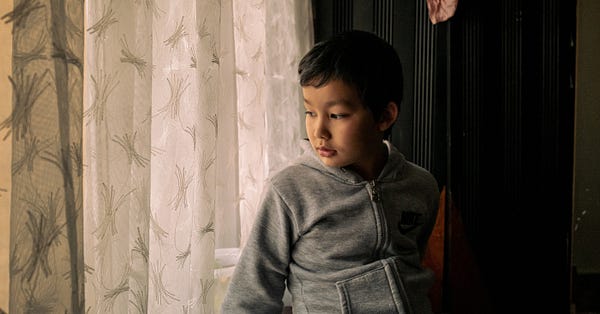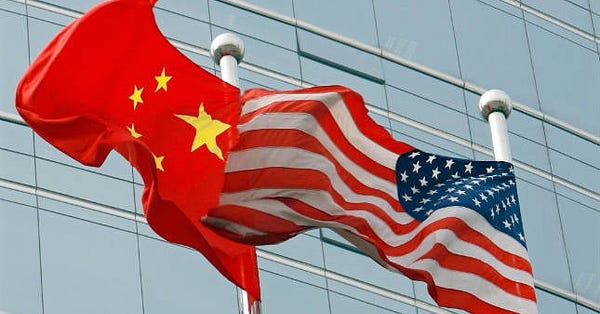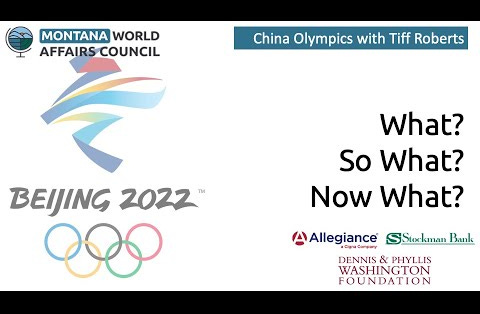Welcome to the 101st edition of Trade War.
The 2022 Olympics opens in Beijing, accompanied by a crackdown on the Chinese internet. The guest list of countries sending senior officials highlights global split between the U.S. and China. And the opening ceremony includes a Uyghur torchbearer.
Uyghur children give first interview after suffering physical and mental abuse in a Chinese boarding school. U.S. House passes sweeping bill to strengthen domestic chips industry and supply chains, as well as censure China over human rights. And Chinese think tank pulls report that shows decoupling hurts China worse than U.S.
Web crackdown during Olympics
Beijing has launched a crackdown on the internet that includes closing the accounts of Chinese dissidents and policing online content and apps, during the ongoing lunar new year and Beijing Winter Olympics, reports Fortune’s Yvonne Lau.
“During important events like the Olympics, when the world is paying close attention to China, the Chinese Communist Party (CCP) is extra vigilant in monitoring what social content is circulating and what the media is saying,” reports Lau.
Dating app Grindr recently was taken off a number of Chinese app stores sparking speculation it has been caught up in the crackdown; the move to remove the app was made voluntarily by Grindr and was in response to the “changing regulatory environment,” a company spokesperson told Fortune.
Beijing “invariably [tries] to curb free expression even further than usual" during such events, Dexter Roberts, senior fellow at the Atlantic Council’s Asia Security Initiative and author of The Myth of Chinese Capitalism, said to Fortune.


Olympics guest list reflects US-China split
The guest list of heads of state and other senior leaders attending the Beijing Olympics demonstrates the growing tensions between China and the West, reports the Wall Street Journal’s Chao Deng.
Some two dozen countries including Russia, Saudi Arabia, Egypt, Qatar, the United Arab Emirates, Pakistan, and Kazakhstan have come to Beijing and are “paying their respects to China’s Xi Jinping,” writes Chao Deng.
Meanwhile, the United States, Great Britain, Australia, and Canada are among a smaller group participating in a diplomatic boycott over China’s wide human rights abuses in Xinjiang and Hong Kong.
Many of the Olympics attendees are from countries in the Middle East and Central Asia that heavily reliant on China for business and trade, while others have bad relations with the U.S. “Many of them were, like China and Russia, excluded from President Biden’s two-day Summit for Democracy in December,” reports the business paper.
Concerns about the U.S. withdrawal from the Middle East helps explain why so many leaders from that region have come to Beijing, writes Chao Deng.
“The U.S. being perceived to have its foot out the door makes diversifying international relationships even more important,” said Jon Alterman, the Middle East program director at the Center for Strategic and International Studies in Washington. “They want to go long on China, short on the U.S. because China seems destined to continue to rise.”


Opening ceremony highlights
Here are some highlights of the Friday opening ceremony of the Olympics from Reuters Pictures.
China-Taiwan unification symbolism?
“Quite a bit of chatter on Chinese social media that this moment in the opening ceremony (a wayward girl being guided back to the flock) is symbolizing Taiwan,” tweets Australian Broadcasting Corp. East Asia Correspondent Bill Birtles.

Uyghur torchbearer at Olympics
In a political gesture that appears pointedly aimed at the U.S. and other country’s criticism of China’s human rights abuses in Xinjiang, Beijing chose a Uyghur cross-country skier to be one of two people to light the Olympic flame, reports USA Today.
“It’s quite provocative,” said NBC anchor Savannah Guthrie. “It is a statement from the Chinese president, Xi Jinping, to choose an athlete from the Uyghur minority. It is an in-your-face response to Western nations, including the U.S., who have called the Chinese treatment of that group genocide.”
NBC, the official Olympics broadcaster, mentioned the Uyghur people some 16 times while using the word “genocide” eight times during the opening ceremony, reports USA Today.
“This was a riposte to President Joe Biden for skipping these Olympics and a message to the West: China won’t be lectured to on human rights, or on any other issue,” Andy Browne, editorial director of the Bloomberg New Economy Forum, told the broadcaster.
“The selection of an Uyghur torchbearer is a deliberate attempt to whitewash genocide, adding insult to injury for millions,” said Rayhan Asat, a Uyghur human rights advocate and senior fellow at the Atlantic Council, in an interview with USA Today.
“This shows that China is scared,” said Asat. “The opening ceremony is its message to the world, and it put Uyghurs at the center, flailing in its lie that everything is fine. The Chinese Communist Party cares profoundly about outside criticism, so let's keep criticizing.”


Harrowing tale of Uyghur kids in Chinese boarding schools
For the first time Uyghur children speak publicly about the physical and mental suffering they experienced in Chinese boarding schools in Xinjiang, in this harrowing report by NPR’s Emily Feng with Abduweli Ayup.
“Under the watchful gaze of their father, the two ethnically Uyghur children say that their heads were shaved and that class monitors and teachers frequently hit them, locked them in dark rooms and forced them to hold stress positions as punishment for perceived transgressions,” writes Feng.
“By the time they were able to return home to Turkey in December 2019, they had become malnourished and traumatized. They had also forgotten how to speak their mother tongues, Uyghur and Turkish. (The children were being raised in Turkey but got forcibly sent to boarding school during a family visit to China),” reports NPR.
With hundreds of thousands of Uyghurs forcibly sent to detention centers to study Mandarin Chinese and Chinese Communist Party ideology since 2017, their children have often ended up in one of at least 1,300 state boarding schools.
"This ideological impulse of trying to assimilate non-Han people corresponded with this punitive approach of putting adults in camps, and therefore lots of young children ended up in boarding kindergartens and boarding schools or orphanages," Georgetown University James Millward told NPR. "It really is an effort to try to make everyone Chinese and see themselves as Chinese and have a single cultural background."
“These family separations have contributed to a slow erasure of the Uyghur language and culture in China, experts say — one of the reasons officials in the U.S., Canada, France, the Netherlands and other countries have declared that China's policies in Xinjiang amount to genocide,” reports Feng.


Competes Act aims at supply chains and China
The U.S. House has passed a sweeping bill that aims to strengthen domestic chips and supply chain capabilities, as well as censure China over human rights, reports The Hill’s Cristina Marcos.
Passed along party lines, with Democrats mainly for it and Republicans against, the bill earmarks $52 billion for domestic chip production and $45 billion to beef up domestic supply chains. Funding for the National Science Foundation and Department of Energy would also increase and efforts would be made to recruit more people to work in the fields of science, math, technology and engineering.
It also includes sanctions on Beijing for human rights violations in Xinjiang and Hong Kong, and creates “China Watcher” positions within the Foreign Service to “monitor and combat Chinese malign influence” at U.S. diplomatic posts abroad. And it has a provision to create a committee to review outbound U.S. investment that poses an “unacceptable risk to one or more national critical capabilities.”
“The America COMPETES Act will ensure that America is preeminent in manufacturing, innovation and economic strength, and can out-compete any nation,” Speaker Nancy Pelosi (D-Calif.) said ahead of the vote on Friday. The bill now goes to the Senate for reconciliation.


Taiwan is not “Chinese Taipei”
The Competes Act also calls for the renaming of the official Taiwan office in Washington D.C. from “The Taipei Economic and Cultural Representative Office” to the “Taiwan Council for U.S. Affairs.”
“[The Competes Act] stresses it is U.S. policy to refer to “Taiwan” as “Taiwan” not “Taipei” or “Chinese Taipei,”” tweets Natalie Tso, host and producer of Taiwan Insider.


Decoupling to hurt China more?
A report by a top Chinese university’s think tank that concluded China would be hurt worse than the U.S. in tech decoupling has been deleted from WeChat, reports the South China Morning Post’s Josh Ye.
The 7,600-character report, comparing the information technology, aerospace, and AI capabilities of the two countries, was posted on the official WeChat account of Peking University’s Institute of International and Strategic Studies, shared widely by Chinese media, before being deleted several days later. Top scholar on U.S.-China relations Wang Jisi heads the think tank which appears to have pulled the report itself. (Link to the Chinese report here.)
“While the current U.S. administration has not yet determined the boundaries of decoupling, certain consensus has already been formed in key tech areas such as chip manufacturing and AI,” the researchers wrote in the report. “Industries that are still ‘linked’ will only be those that are low-tech or have low added value.”
“In the future, China can narrow its gap with the US in more technological areas and China can achieve ‘self-sufficiency’ in some core technologies, but it remains a long way off before China comprehensively surpasses the US,” the report said.
At the end of last year Harvard Kennedy School’s Belfer Centre for Science and International Affairs predicted that China is on course to surpass the U.S. in the next decade in fields including AI, semiconductors, biotechnology, and 5G.


Notable/In Depth
Here is my quick take on the Beijing 2022 Winter Olympics, on the eve of its opening, speaking to the Montana World Affairs Council.


San Francisco-born free-style skier and model Eileen Gu, competing in the Olympics for China, the birth place of her mother, faces a tricky geopolitical minefield, writes the New York Times’ John Branch.


With Covid deaths nearing one million in the U.S., China reaches a notable milestone: its life expectancy has surpassed that of the U.S..
“China’s focus on [the] “Common Prosperity” goal is not yet reflected in its tax structure,” tweets Bert Hofman, former head of the World Bank in China.


A whistleblower who reported on student workers in a Chinese Foxconn factory making Amazon’s Alexa devices, says he was tortured before being jailed by Chinese officials. Now he has written a letter asking for help from billionaire Jeff Bezos, reports the Guardian.


Very good rundown on the challenges facing the Chinese economy, examining zero-Covid policy, Evergrande and the property crackdown, and Common Prosperity, in this Economist podcast.


"Stumbling on this dormant manuscript was like exhuming a document from a long sealed tomb … filled me with a recognition of how little China’s Leninist system, especially its penal system, has changed," writes Orville Schell, director of the Asia Society’s Center on U.S.-China Relations, in this powerful piece for The Wire China.


Must-watch conversation between two of the top journalists on China, Australia’s Richard McGregor and Chris Buckley, moderated by former New York Times China bureau chief Jane Perlez.


Montana morning
A cold but beautiful recent morning.








